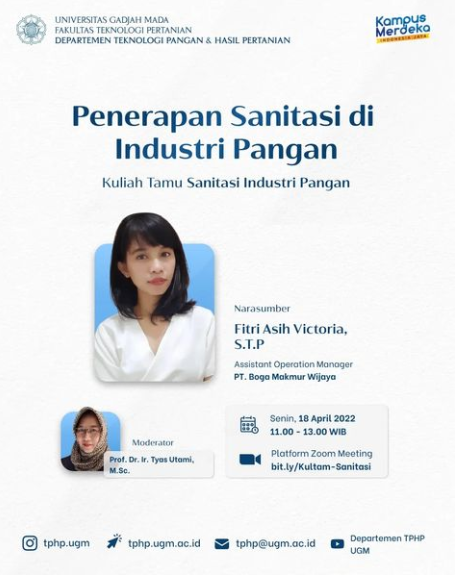
The Food Industry Sanitation course held a guest lecture on Monday, April 18, 2022, from 11.00 – 13.00 WIB. This guest lecture carries the topic of the Application of Sanitation in the Food Industry with the speaker, Fitri Asih Victoria, S.T.P. as Assistant Operation Manager of PT. Boga Makmur Wijaya and guided by Prof. Dr. Ir. Tyas Utami, M.Sc. as moderator.
 A restaurant is a place that is organized commercially to provide good service to guests in the form of food and drinks. Restaurants have their uniqueness, namely raw materials that have a short shelf life and there is direct interaction between suppliers (raw material sellers), sellers (restaurants), and buyers (customers). However, this uniqueness is also a challenge during a pandemic because it can increase the risk of Covid-19 transmission.
A restaurant is a place that is organized commercially to provide good service to guests in the form of food and drinks. Restaurants have their uniqueness, namely raw materials that have a short shelf life and there is direct interaction between suppliers (raw material sellers), sellers (restaurants), and buyers (customers). However, this uniqueness is also a challenge during a pandemic because it can increase the risk of Covid-19 transmission.
Raw materials with a short shelf life require control measures to prevent potential microbiological, chemical, and other contaminants that could endanger human health. The control measures taken consist of Critical Control Point (CCP) identification and Operational Prerequisite Program (OPRP). CCPs are required to prevent, eliminate, and reduce hazards to predetermined acceptable levels. Meanwhile, OPRP is required to support the effectiveness of CCP implementation.
“Other challenges in the restaurant industry are competition from similar brands (marketing support), raw material availability (supplier contracts), and quality consistency (raw materials versus human resources),” said Mrs. Fitri. She said that these three things also need to be managed to maintain customer trust in the restaurant industry.
Along with the Covid-19 pandemic, the implementation of health protocols also needs to be implemented in restaurants. Diners are required to wear masks, wash their hands with soap, and check their body temperature before entering the restaurant. Physical distancing in restaurants can also reduce the potential for virus transmission, especially indoors. Then some restaurants have also used a menu system that is equipped with online payment methods so that existing interactions can be minimized. In addition, health protocols also apply to restaurants, namely by maintaining employee health, wearing masks and gloves, as well as sanitizing and disinfecting service areas and kitchens.




